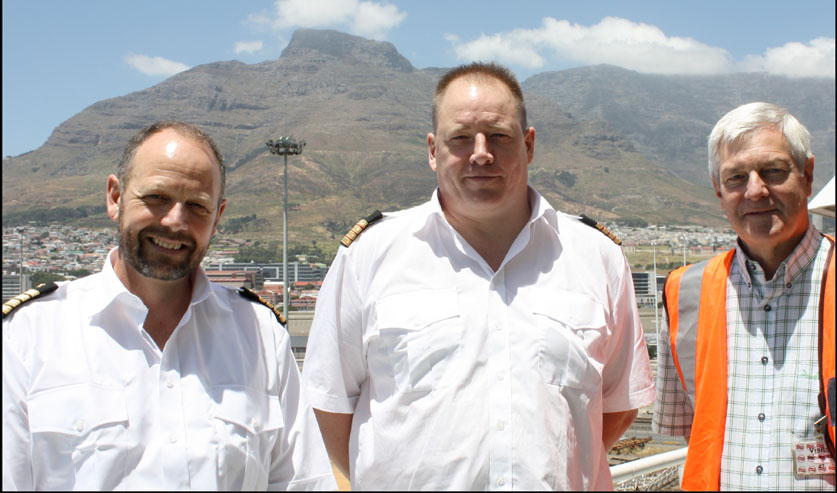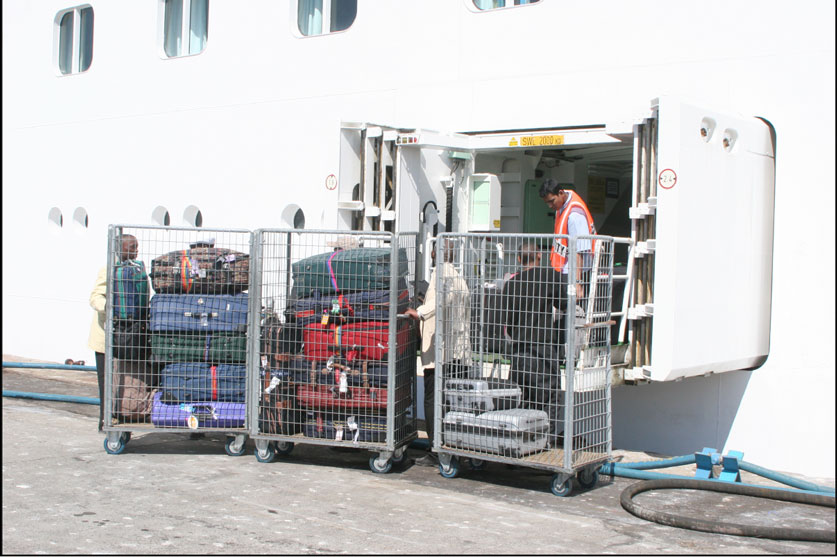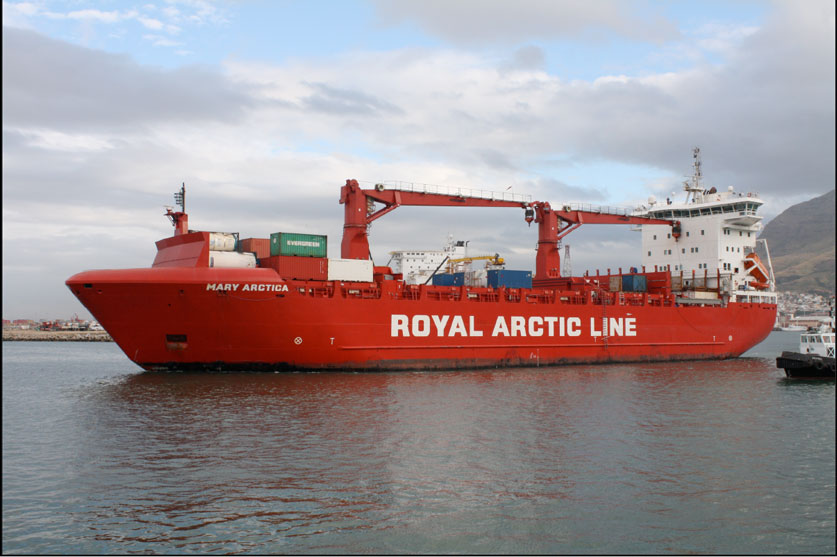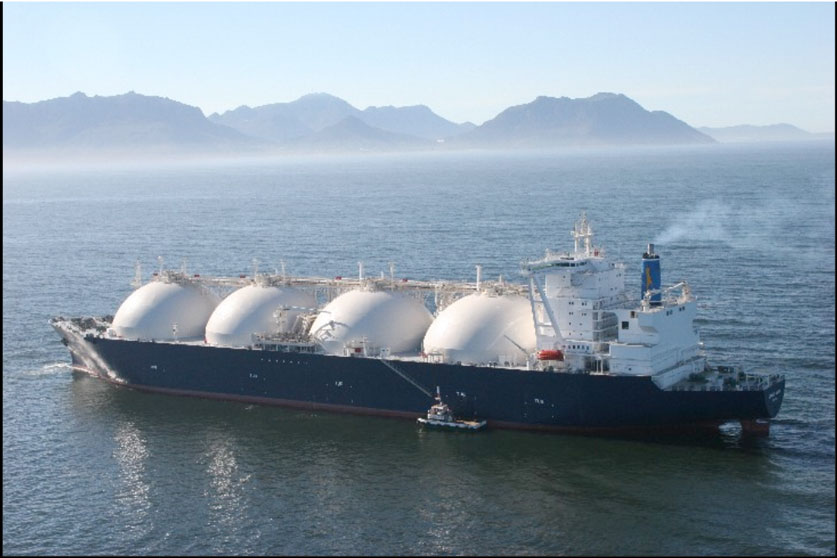Every ship entering harbour must have an agent. The shipowner appoints the agent in each port of call. (NOTE : If the ship is on charter, the charterer may appoint an agent in a port of call to look after the charterer’s interests.) However, a ship’s agent represents either the shipowner or the charterer – or both.

The Master and Chief Engineer of the Danish vessel Mary Arctica with one of South Africa’s most experienced ships’ agents, Nils Warner. The ship was in Cape Town to carry cargo and fuel to an Antarctic research base. For that call in Cape Town, Mr Warner’s company would have done all the preparations, monitored all the loading and refueling in port, and the follow-up work once the ship had sailed. See the paragraphs below. Photograph : Brian Ingpen
The Role of the Ship’s Agent before the Ship Arrives
- He must book a berth for the ship via the Berth Planner in Port Control and submit Form ID100 on the port management system.
- The berth must be long enough and the water depth must be deep enough to accommodate the ship.
- The wharf area needs to be wide enough for cargo discharge/load (if required).
- The wharf must be accessible by train or road truck, if required.
- The wharf must be accessible for bunker supply, if necessary.
- He must alert Immigration (Home Affairs in South Africa), Custom (SARS) and Port Health regarding the ship’s ETA.
- Home Affairs – control of people entering & leaving the country.
- Customs – control of goods entering & leaving the country
- Port Health – need to ensure that ship is clear of infectious diseases.
- He must ensure that the ship is “cleared” by the maritime authority in terms of the International Ship and Port Security Code (ISPS)
- He must make all arrangements requested by the owner or master of the ship, e.g.
- Order fuel for the ship from local bunker supplier
- Ensure stevedores are aware of cargo arrangements
- Order stores from chandler(s)
- Arrange bookings for any crewmember leaving the ship (taxi, accommodation, airline ticket, etc)
- Advise all service providers (especially Port Control and owner) of any changes to the ship’s ETA.
- Keep the owner and the ship’s master informed of all his actions.
- He may need to arrange for a road tanker to collect black water (sewage), grey water (water from showers, the galley, etc) and slops (oily waste). Liquid waste from ships is carefully controlled, and that which may not be discharged at sea, must be landed. The agent will also arrange to have a skip available near the gangway for solid waste.
Role of the Agent when the Ship Arrives
- The GOOD agent is on the wharf when the ship arrives – irrespective of the time.
- He may not board until the ship has been “cleared” by immigration, customs & port health.
- He gives all necessary documents to the master.
- He discusses everything that will need to be done while the ship is in port – cargowork, travel/medical arrangements, bunkering, stores deliveries, waste removals, etc.
- He brings newspapers, mail, magazines to the ship.
- He informs the owner of the ship’s arrival.
Role of the Agent while the Ship is in Port
- He liaises regularly with the Master (visits the ship perhaps twice a day.)
- He ensures that all work (cargowork, bunkering, repairs, storing, etc.) is going according to plan.
- He keeps updating the owner on the progress of cargowork, bunkering, repairs, storing, etc.
- He keeps updating Port Control of vessel’s ETD.
NB : If Port Control is not advised within the required time of a change to the ETA and the tugs and pilot arrive at the ship at the original time of sailing, the company will be charged for their services. Most ports require at least four hours’ notice of sailing – but the longer the notice the better.

Apart from the usual arrangements for a ship arriving in a port, imagine all the arrangements that have to be made before a large passenger ship arrives. Hundreds of passengers and their baggage have to leave the ship; others will join the ship with their baggage; the delivery of large amounts of food, water, and other stores has to be arranged; minor machinery repairs need to be done; perhaps thousands of items need to be taken to a shoreside laundry; security services, bunkering, and the removal of waste also need to be arranged. Photograph : Brian Ingpen
Role of the Agent when the Ship is about to Sail
- He should eensure that all cargowork, bunkering, storing, repairs, etc have been completed.
- He should ensure that the draught survey has been completed (if required).
- He should ensure that all documentation has been completed.
- He should ensure that all crewmembers are aboard – and that the crewlist is complete.
- He must ensure that Immigration & Customs have cleared the ship.
- He must confirm the ship’s ETD with Port Control who will send tugs, pilot and berthing gang.
Role of the Agent as the Ship Sails
- He should ensure that he has all the documents, including the latest crewlist.
- He should ensure that he has the mail for posting.
- He should ensure that disembarking crewmembers have their passports.
- He should be the last to leave the ship.
- He should wait at the harbour until she has sailed, in case any last minute delays or other problems occur.

Mary Arctica sailing from Cape Town, bound for Antarctica. Photograph : Brian Ingpen
Role of the Agent after the Ship has Sailed
- He should inform the owner and the agent at the next port of the ship’s actual time of departure and her ETA at the next port.
- He should ensure that the waste removal company removes the skip.
- He should ensure that all the bills for the ship’s stay in port have been received and that they have been paid.
- He must prepare a disbursement account for the owner, covering all expenses incurred while the ship was in port.
(The owner will have advanced an amount of money to the agent before the ship arrives. The agent uses this to pay the bills on behalf of the owner. Once the ship has sailed, he prepares the disbursement account that shows all the expenses and he calculates whether the owner owes him any money or whether the owner advanced too much money to the agent, in which case, the agent owes the owner money. The party owing money then settles the account.)
Role of the Agent when a Ship calls Off Port Limits
Many ships do not enter port but by-pass the port. Yet they may need stores, a crew-change, urgent spares, even fuel or other items. By taking stores or making crew changes off port limits saves the ship time and considerable costs. If the transfer of stores or crewmembers is done by helicopter, the ship need not divert much from her course and need not slow down much. This saves time and fuel. Obviously, a helicopter cannot carry as much stores or as many personnel as a launch.
If an injured or ill crewmember needs to be taken off the ship, a helicopter is usually better as the operation is far quicker and the helicopter can fly directly to a hospital.
- The agent needs to assess whether a helicopter or a launch will be needed to carry the supplies, crewmembers, etc to or from the ship.
- He needs to book the helicopter/launch.
- He must advice immigration and customs if anyone is disembarking or embarking off port limits.
- Anyone joining the ship will need to be cleared by immigration before going out to the ship.
- The agent must ensure that all documents and mail are taken out to the ship.
- When on board the ship, the agent must ensure that all documentation is completed by the Master.
- He must ensure that disembarking crewmembers have their passports.
- He must be mindful of the time – a helicopter has limited time in the air, and costs mount per hour. Even a launch can be expensive.
- On his return from the ship, he must take any disembarking crewmembers to immigration and customs.
- Sometimes, emergency evacuation of an ill or injured crewmember is necessary. This is done using a launch or helicopter.
- The agent needs to alert a doctor or team of medics to accompany the helicopter/launch to ensure that the patient is treated as soon as possible.
- All other procedures (immigration, customs, etc) need to be followed, but their timing depends on the condition of the injured/ill person.

The gas carrier Grand Aniva taking stores from a launch off the Cape Peninsula coastline. Photograph : Andrew Ingpen

AGA Helicopters’ aircraft bringing supplies to an oil rig off the South African coast. Photograph : AGA Helicopters
Role of the Agent when a deceased person needs to be repatriated
Occasionally, an agent may need to organise that the body of a deceased crewmember is landed by launch or helicopter.
- All his belongings should be brought ashore (with an inventory of those belongings, a copy of the log entry relating to the death, and his passport)
- Immigration, customs and port health need to be informed, and an official death certificate showing the cause of death must be issued. If foul play is suspected, the police need to be informed.
- Instructions from the next of kin regarding the disposal of the body must be followed implicitly.
- The ambassador/consul of the country of the crewmember must be involved if the body has to be sent to the deceased’s home country.
- The body is usually repatriated by air.

